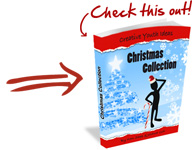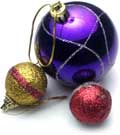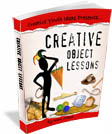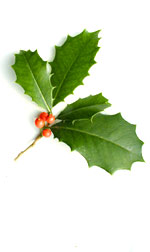Aromas (December 1)
Identify Christmas scents by smelling small bags containing apple slice, bayberry candle, clove, ginger, peppermint, or pine cone. Place fresh evergreens around. Add spices, (rosemary, laurel, bay, sage) to wreaths and greens. Make a pomander ball by pressing whole cloves into an unpeeled orange and hanging it as a symbol for Christmas fragrances.
Bells (Dec. 2)
Sing “Jingle Bells” while each family member shakes the rhythm with a bell. Make a set of bell chimes by filling water glasses unequally and see who can tap out a recognizable melody with a spoon. Hang bells as the symbol.
Candles (Dec. 3)
To reinforce the symbolism of light use Christmas candles. Line a driveway or walk with luminaries (candles set in open paper lunch bags half filled with sand) Set votive or electrical candles in windows. Make a candle carving by tracing a design onto a thick candle and shaving away the wax with a knife. Eat dinner by candlelight. Take a few quiet moments of meditation by candlelight.
Decorations (Dec. 4)
Go out to view decorations and vote on the one which best communicates the true meaning of Christmas. Sing carols about decorations between stops (“Deck the Halls” “Jingle Bells”). Begin to hang your Christmas decorations. Create personalized paper placemats with drawings, stickers, dry transfers, markers, and paints and cover them with plastic wrap or clear shelf adhesive to preserve them.
Eating (Dec. 5)
Use a cookie as today’s symbol. Make some wassail. Wassail means “be well” so drink each cup as a toast to each other’s health. Make plates of cookies as gifts and watch your children enjoy the true meaning of Christmas – giving to others.
Friends (Dec 6)
Prepare a conversational activity and snacks for friends who drop in. You might set up a table with a jigsaw puzzle (500-1000 pieces) to try to complete by Christmas with the help of friends. It’s appropriate that Jesus’ first friendly visitors were shepherds for he became the good shepherd. Hang candy canes, shaped like a shepherd’s crook.
Greetings (Dec 7)
Place Christmas cards received in a basket on the dinner table and take turns reading one at each meal. Share happy memories of the senders and include them in prayers. Make a “Good News paper” about Jesus’ birth, including a birthday announcement, copy of Caesar’s census decree, interview with King Herod, a notice about the free concert by the Herald angels in pastures near Bethlehem, etc. The good news of Christmas is that a Savior has been born.
Home (Dec. 8)
People without a home or away from home tend to feel more lonely at Christmas time. God understands because his Son was away from home for the first time on Christmas Eve. Joseph and Mary spent their first Christmas in Bethlehem, about 60 miles from their home in Nazareth (a 3 day trip). Having no friends or relatives with whom to stay, and no advance reservations at an overbooked hotel, they spent Christmas in a stable. The first home of Jesus, our Spiritual Bread of Life, was Bethlehem which means “house of Bread” Sing “O Little
Town of Bethlehem as your family prayer.” Symbol: house.
Individuals (Dec 9)
The ultimate meaning for Christmas is personal, the need for each person to receive God’s gift of forgiveness and eternal life. As a symbol use a picture frame with the child’s picture. Read “A Christmas Carol” by Dickens to focus on the needs of others.
Jesus (Dec. 10)
Hang a cross to symbolize Jesus. Have a Birthday celebration for Jesus with a star shaped cake. Wrap a toy and donate to a charity as a gift to Christ.
Kin (Dec. 11)
Christmas is a time to be with family. Hang a family symbol or photo. Talk about Jesus’ family. Do something together as a family.
Love (Dec. 12)
Hang a heart as the symbol. Make a large red heart and write on it the qualities of true love from I Cor. 13
Music (Dec. 13)
Hang a musical note as a symbol. Invite friends to join you in singing carols for shut ins or seniors. Play Christmas music around the house.
Nativity (Dec. 14)
Set out a nativity scene. Add pieces daily explaining their relationship to the manger story. Leave the manger empty with a box of straw. When children do good deeds let them place a piece of straw in the manger with the goal of having it filled for Christmas when you place Jesus in it.
Ornaments (Dec. 15)
Help children make personal ornaments. Make or purchase one cross ornament as a reminder that Jesus’ cradle was the prelude to the cross.
Present (Dec. 16)
To focus on giving gifts or presents: help someone less fortunate through donations. Help each person choose and wrap a symbol of an intangible gift for Jesus (i.e. a
heart for love, a clock for time, etc.)
Questions (Dec. 17)
Hang a question mark on the tree. Have a quiz on Christmas facts, a spelling bee on Christmas words, etc. The wisemen asked a question in Matt 2:2 seeking Jesus to worship him.
Red (Dec. 18)
How many red Christmas items can you name? Hang one as a symbol. Red symbolizes the blood of Christ, as well as, red holly berries and poinsettia leaves which are vivid reminders of life in a lifeless winter.
Stocking (Dec. 19)
Renouncing wealth to serve as a church leader, legend says Saint Nicholas gave his inherited wealth away by putting gold in stockings hung to dry.
Tree (Dec. 20)
Establish some family traditions based around the Christmas Tree. Explain how three trees explain the Christmas story – Adam lost access to the tree of life by eating from the forbidden tree but Jesus reopened the way to the tree of life by his sacrifice on the cross (itself a tree).
Unwrapping (Dec. 21)
Use an open box to symbolize the unwrapping of gifts.
Vacation (Dec. 22)
Create a vacation calendar and on it creatively plan and build anticipation as to how holidays can be spent.
Wreath (Dec. 23)
See who can count the most circular Christmas items around the house. A wreath is like Jesus in that it never ends.
Xmas (Dec. 24)
Christmas literally means “celebration of Christ” The X represents the first letter of Christ in the Greek alphabet. Hang a Chi-Rho cross as a symbol, the first two letters of Christ.
Yule (Dec. 25)
Yule is another name for the Christmas Season. You might use a yule log as a symbol. On Christmas morning ask children to stay in bed until they hear Christmas music playing. No Christmas presents are to be opened until everyone is present. Share a worship time before opening gifts. Do at least one fun activity as a family. Make Christmas dinner special with a centerpiece and lighted candles.. Make Christmas place cards with Scriptures to be read. See which family members can share the significance of the 25 ornamental symbols hung this month.
Condensed and adapted from “An Advent Alphabet” by
Karen and Terry Hall, Moody Magazine, December 1986
 Christmas Collection
Christmas Collection
 If you saddled your six-legged droozle and rode
If you saddled your six-legged droozle and rode What do sand, trees, money, pearls, wheat, and mustard seeds have in common? Jesus used them all as tangible symbols or object lessons to help his disciples to understand and remember intangible truths. The Master Communicator often attached deeper meanings to common things and objects.
What do sand, trees, money, pearls, wheat, and mustard seeds have in common? Jesus used them all as tangible symbols or object lessons to help his disciples to understand and remember intangible truths. The Master Communicator often attached deeper meanings to common things and objects.
 Materials
Materials While the use of holly is rooted in pagan lore, many Christian legends have developed over the centuries to the point that it is now linked with Christmas. In some parts of Britain holly was formerly referred to merely as Christmas, and in pre-Victorian times ‘Christmas trees’ meant holly bushes. Even so, “Decking the Halls with Boughs of Holly” is an ancient custom several thousand years old. In fact, the ancient Romans, Greeks, Chinese and Druids all decorated their homes with this plant.
While the use of holly is rooted in pagan lore, many Christian legends have developed over the centuries to the point that it is now linked with Christmas. In some parts of Britain holly was formerly referred to merely as Christmas, and in pre-Victorian times ‘Christmas trees’ meant holly bushes. Even so, “Decking the Halls with Boughs of Holly” is an ancient custom several thousand years old. In fact, the ancient Romans, Greeks, Chinese and Druids all decorated their homes with this plant.